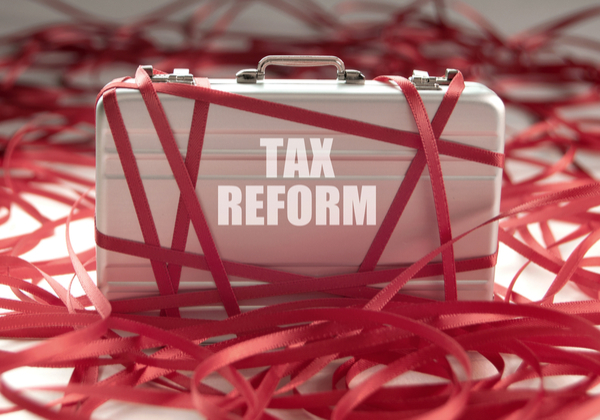Why the proposed changes to franking credits fail the pub test … and the academic test as well.
With the federal election only weeks away, tax is one of the main talking points from both the major parties. The problem is, there’s a lot of rhetoric, debate and conjecture as each tries to find a point of difference … and not much in the way of real tax policy.

By Michael Mekhitarian
If Labor is elected next month, Australians could face a number of significant taxation changes, including:
- The abolishment of refundable franking credits
- Change to the existing negative gearing system
- An increased capital gains tax
- Changes to income tax
- Increased taxes on superannuation
- Ban on borrowing in self-managed superannuation funds
- Changes to taxation on distributions from discretionary trusts
Oh, and let’s not forget that Labor has also mooted the possibility of a death tax.
Every new government fiddles around with existing legislation as a way of ‘marking their turf’, taking an authoritative stance as soon as they get into office – be it via tax or otherwise. And this is not the first election ever in Australian history where tax has been front and centre of political debate in the lead up. Remember the introduction of the GST?
But what’s so frustrating about this current batch of intended changes is that they are not being clearly explained.

Confusion reigns
Let’s take the proposed changes to franking credits, for example.
Self-funded retirees and individual share market investors (particularly those with low incomes), will be considerably affected under Labor’s proposal.
Refundable franking credits have been in place since Paul Keating introduced them during his tenure as treasurer, somewhere around the mid-1990s.
Peter Costello and John Howard tweaked the system, and currently, the policy allows for an individual or superannuation fund that has imputation credits exceeding their tax liabilities, to be entitled to a cheque from the government handing back the difference.
Failing the pub test
Labor wants to change this. But its idea is so excruciatingly complicated that it’s not possible to make any sense of the potential pros and cons. Changes include a ‘pensioner guarantee’ as well as numerous other ‘exemptions’ too, but these are so ill-articulated it’s difficult to make head or tail of any of them.
For this reason, changes to franking credits absolutely fail the ‘pub test’.
Here are some of the distortions in the policy:
- A self-funded retiree without a pension fund will NOT get a franking refund, but a retiree with a pension fund will.
- A self-managed super fund with a pensioner in it as at March 2018 will, but those with pensioners from April 2018 won’t.
- Retail super funds will get franking credit refunds as will industry super funds.
Confused? You’re not alone … but basically, it boils down to this: (in words based on those penned by George Orwell) ‘Everybody is equal, but some are more equal than others.’
Under this proposal, people are treated very differently simply because of their circumstances. Consider for a second, two retired tradies. One has no super and $1 million in the bank, and the other has not much money in the bank and $1 million in super. They both obtained NRMA shares when it demutualised, but their taxes will be vastly different, because one will get franking credits, and the other won’t.
Failing the ‘academic’ test
Most of us understand, and accept, that taxation is the necessary source of government revenue that funds vital infrastructure: schools, hospitals, roads and so on, and assists the vulnerable members of our community.
Furthermore, we place inherent trust in governments to set tax policy that is appropriate. We expect that in setting tax policy, governments consider guiding principles such as:
- Equity and fairness
- Certainty
- Simplicity – a system that is clearly understood by taxpayers
- Neutrality – in essence, a tax system’s primary purpose should be to raise revenue, not change behaviour
- Economic growth and efficiency, meaning that a tax system should not impede productivity nor favour one industry or type of investment over another
- Transparency and visibility, which comes down to clear communication
- Appropriateness in line with government revenue, enabling the government to determine how much tax revenue it likely will collect and when—that is, the system should have some level of predictability and reliability
- Cost efficiencies, meaning that taxes should not be overly burdensome to set, enforce and collect, for the government or the taxpayer
Straight up, using the example of tradies above, you can see the inequity in the proposed policy. But carefully consider the other points too – franking credits fail at every single level.
Another of the proposed policies, the changes to borrowings in an SMSF also fail.
Why should a business owner such as a plumber or cabinet-maker be effectively banned from buying a factory unit within their super fund, to run the business? What’s being presented here also amounts to gross unfairness – the consequences of which will be felt far and wide, by many hard-working Australians.
What’s also critical to point out, is that Labor also intends to cap the amount that individuals can claim via tax for the management of their financial affairs at $3,000. If this proceeds, then this particular policy will actually impede individuals from getting tailored, experienced professional advice at a time when they will need it the most, to navigate their way through a labyrinth of numerous, and not insignificant, changes to tax policy.
Politicians need to provide clarity
At the end of the day, governments need above all, to provide clarity, certainty and stability – to people and to business.
Instead, what we seem to have right now is two major political parties vying for votes by tampering with, and reconstructing, tax policy in ways that not only seem ill-thought out, but totally lacking in detail, debate and discussion.
And we’re continually presented with examples of how things work in other parts of the world (by the way, dividends are not taxed in Singapore, and the UK has no imputation refunds, even to pension funds) which, in all honesty, have little or no relevance here.
Australia should be aiming to create the world’s best and fairest tax system, not one that’s constructed solely to win votes by misinforming and creating uncertainty.
This kind of confusion and conflicting information robs voters of the chance to make an informed decision on election day, a fundamental cornerstone of the democratic system we value so greatly in this country. What’s more, it’s short-sighted, and completely misaligned with what individuals, families and businesses really need.

Tax reform should be on the agenda
There is no doubt that tax reform should be top of the political agenda.
But reform needs to be approached with caution. And it needs a strong, overarching strategic vision to ensure that taxes are what they should be: a streamlined, efficient, revenue-generating component of our economy.
It’s time to deconstruct this cumbersome mess and reconsider the academic guiding principles of a fair taxation system. That way we’ll be guaranteed a system that’s not only appropriate, rigorous and impartial, but will also pass the pub test.
